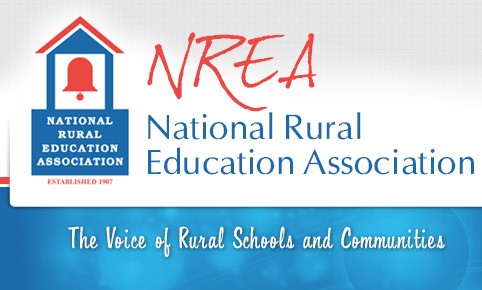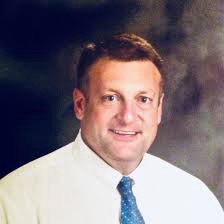Executive Director at the National Rural Education Association

This month’s member spotlight focuses on Dr. Allen Pratt, the Executive Director of the National Rural Education Association (NREA). Based in Chattanooga, TN, NREA is the voice on rural communities and schools across the United States. Originally founded as the Department of Rural Education in 1907, it is the oldest national organization of its kind in the United States.
Q: Tell us about the work of the National Rural Education Association.
Pratt: We fight for the rights of rural schools and communities, but also provide service advocacy to those schools and the state affiliates we represent. We have members in all 50 states. We have 42 stand-alone state affiliates that are a part of the national organization. They do a lot of service work for the schools that they represent in each state.
 Q: What are some of the issues that the NREA focuses on?
Q: What are some of the issues that the NREA focuses on?
Pratt: Obviously the teacher shortage issue, finding highly qualified, skilled teachers for our schools, especially areas of high need. That is a big issue. We look at broadband as part of the homework gap and connectivity issue. And we look at ways that we can improve our rural schools’ community engagement.
One of the downsides of the past 15–20 years is that our schools have had to focus so much more on state accountability and testing that they lost some of their ground in their communities and what made them so special. We realized we had to have that community connection, and we have to let our kids know why it’s important to be in a rural community — and what there is to offer in those rural schools and communities, which ties into the question about why civics is so important to us.
Q: So why CivxNow and why now?
Pratt: I was introduced to CivxNow when I was a speaker on a panel at Harvard, and we were asked if we wanted to be a part of something that is supporting civics and civic action in our rural communities. We want our students to be future leaders of our regions. And we have to educate them but also make them feel like a part of the process of what a community is about, and what it means to be civically responsible and a member of the community.
Q: What is the difference between what civics might mean to a school in a big urban center and the schools that you work with?
Pratt: In a lot of areas, you can be in a big metropolitan center and drive 15 to 20 minutes and be in a rural area. Just look at Tennessee, and those little areas just outside of Nashville. Being a civically responsible person in those areas or being a civically responsible person who is part of that urban community, there are a lot of similarities but it is also very different. The people in those small rural areas have the opportunity to engage at a much higher level. Where I live, it’s not uncommon for our students to be involved with the mayor, the city or county commissioner on a personal level in a way that it may not happen in a larger urban area.
Q: So you’re saying that in a small town you have the opportunity to have a big voice.
Pratt: Students can have a major voice. Sometimes they feel their voice is listened to because the have a direct connection. They can make some positive changes. If adults will listen, some good things can come out of it.
Q: Even with those close connections, though, has civic engagement become a problem like it has in many major cities?
Pratt: I think so. The framework of our schools had to change because of what we were asked to do at the state or federal level. And I will be honest with you, a lot of times our K-12 schools have not done a good enough job reaching out to their communities. They do things like fundraisers. But to actually get students involved in the process, and to teach them how the sausage is made at the city and county level, we need to be more involved in that process, and we kind of walked away from that. This is a side effect of what we were told we had to focus on. Now, I hope that we are swinging back the other way and realize we need to focus on connection to the community, connection to jobs, and connection to why it’s important to be in our areas.
Q: How might your concerns be different and the same as some of the other members of the Coalition?
Pratt: We’re all talking about local and regional connections, even if its in a big city. A lot of times when you are looking at urban vs. rural concerns, many are the same — especially when you’re dealing with poverty and concerns surrounding teachers.
But the engagement process is different in urban areas. It may just be a different process. In a rural area, a student could probably just pick up the phone and call the mayor. That’s different than being in an urban area.
Q: And yet you still have the same problem with disengagement among youth?
Pratt: Yes. We still have that problem. It goes back to the fact that any time you have mandates pushed upon schools in general, there are important things that got left by the side, and engagement is an important issue.
Q: Do you know of any real success stories about bringing civics back into a rural school?
Pratt: A lot of your rural communities that are thriving because they have active civic engagement. They want their children to have a voice in their education and also in their learning process. You see people in that area actively involved. This can be anything from social media to actual face-to-face engagement. That is opening doors for those rural students and students in general to have a voice or a say in what is going on. There are all kinds of examples of communities across the country of that happening. You can look at one-room schoolhouses in Montana to larger rural districts in Colorado or Texas. The school is the hub.
Q: Can you talk about how needs differ in different rural areas?
Pratt: Rural means something different to every different part of the nation. So what rural looks like in Tennessee is different than what rural looks like in Upstate New York. A lot of that has to do with the history of the area but also the challenges of funding and challenges of how we educate children and the demands of the state.
Q: How important is civic education to these districts as we get closer to the 2020 election?
Pratt: I think it is powerful that our students are number one engaged in the conversation, and then number two, if they are of voting age, that schools need to do something special to allow them to vote, or make a big deal out of voting. I think that can be powerful. Last election it was my daughter’s first time to vote. I took her to vote because my dad took me for my first time to vote.
That engagement is important. I also think that for their voice to be heard and to let people know what they think about the election and what they think about certain candidates, that is good to talk about in schools. Just because we might not agree on everything I think it’s good to have open conversations without everyone getting mad. We need to just talk through the situation.
Q: How has that played out in the past?
Pratt: I don’t think that it has been as big a problem in rural areas as it is in other areas because I don’t think that the rural folks — and I mean this in a nice way — they don’t mind having disagreements. But I was in a meeting recently, and someone said, “Well, he represents this group, and they all voted for President Trump.” And I go, “No. You can’t make that statement. That’s a generalization.” That’s like saying inner-city Chicago all voted for one person. It doesn’t go that way.
They would be offended that I said it. I was offended that they said it. For a long time, rural America voted for the Democrats. It’s just one of those things. A lot of rural America votes the way that they think will help their pocketbook or their wallet or their local economy or their farm or their community. That’s how they vote.
Q: Do you get the sense that rural areas feel that their voice isn’t heard?
Pratt: It feels like that in every election. We run a weekly newsletter, and two of the three articles that we’re going to run this week are about whether the Democrats have left rural America and whether America actually listening to rural America.
Is there a divide between what you think we want and what we’re actually saying? We’re not political. We don’t support candidates. But I listen to what [the candidates are] saying about education policy. Sometimes they tell us what they think we want to hear. And I just want to say, “OK. You just hush. Listen to what we have to say, and we’ll tell you what we need.”
Q: What does the CivxNow Coalition need to hear from the rural schools?
Pratt: I think the coalition needs to know that it is very important to us, to rural schools, that we are involved because it is a big process for our rural communities. And once we get rural students re-engaged in the process, it will be better for everyone. They rely on rural America to feed them and protect them, so it’s important that we are engaged civically.
— — — — —
Share Insights from Dr. Pratt on Social Media
“We want our students to be future leaders of our regions. And we have to educate them but also make them feel like a part of the process of what a community is about, and what it means to be civically responsible and a member of the community.” -@PrattAllen @nrea1 #CivxNow
“A lot of your rural communities that are thriving are thriving because they have that active civic engagement. They want their children to have a voice in their education and also in their learning process.” -@PrattAllen @nrea1 #CivxNow
“for [students’] voice to be heard [about the election and candidates]…that is good to talk about in schools. Just because we might not agree on everything I think it’s good to have open conversations…We need to just talk through the situation.” -@PrattAllen @nrea1 #CivxNow
“once we get rural students re-engaged in the process, it will be better for everyone. They rely on rural America to feed them and protect them, so it’s important that we are engaged civically.” -@PrattAllen @nrea1 #CivxNow
— — — — —
Post originally from Wednesday, September 18th, 2019 CivxNow Coalition Newsletter.


 See All
See All